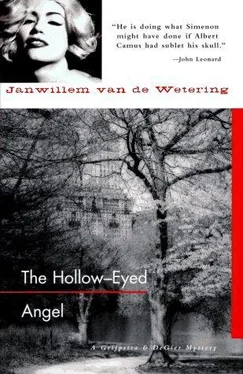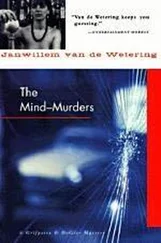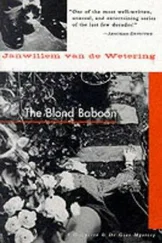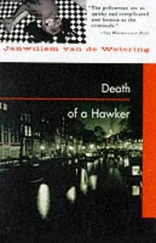Janwillem De Wetering - The Hollow-Eyed Angel
Здесь есть возможность читать онлайн «Janwillem De Wetering - The Hollow-Eyed Angel» весь текст электронной книги совершенно бесплатно (целиком полную версию без сокращений). В некоторых случаях можно слушать аудио, скачать через торрент в формате fb2 и присутствует краткое содержание. Жанр: Полицейский детектив, на английском языке. Описание произведения, (предисловие) а так же отзывы посетителей доступны на портале библиотеки ЛибКат.
- Название:The Hollow-Eyed Angel
- Автор:
- Жанр:
- Год:неизвестен
- ISBN:нет данных
- Рейтинг книги:3 / 5. Голосов: 1
-
Избранное:Добавить в избранное
- Отзывы:
-
Ваша оценка:
- 60
- 1
- 2
- 3
- 4
- 5
The Hollow-Eyed Angel: краткое содержание, описание и аннотация
Предлагаем к чтению аннотацию, описание, краткое содержание или предисловие (зависит от того, что написал сам автор книги «The Hollow-Eyed Angel»). Если вы не нашли необходимую информацию о книге — напишите в комментариях, мы постараемся отыскать её.
The Hollow-Eyed Angel — читать онлайн бесплатно полную книгу (весь текст) целиком
Ниже представлен текст книги, разбитый по страницам. Система сохранения места последней прочитанной страницы, позволяет с удобством читать онлайн бесплатно книгу «The Hollow-Eyed Angel», без необходимости каждый раз заново искать на чём Вы остановились. Поставьте закладку, и сможете в любой момент перейти на страницу, на которой закончили чтение.
Интервал:
Закладка:
"Nothing to nothing."
And, Charlie said, what Termeer had wanted to show Sunday morning crowds in the public parks of Boston, Massachusetts, and Bangor, Maine (the Central Park authorities had thrown the exhibit out), after he had put up his line of figures, a tiring exercise since some of them were heavy, was that there was nothing in between the two nothings either.
Termeer's show-nothing, to rapidly changing embryos, to baby, to toddler, to little kid, to kid, to young adult, to grown person, to middle-aged man, to codger in C 246 1 increasingly debilitated and demented stages, to corpse, to skeleton, to crumbling bone, to nothing-highlighted a common denominator: lack of substance.
No substance to the body. No substance to the mind.
"Would you," Charlie asked the commissaris, "accept as your essence your aches and pains?
"Would you," Charlie asked de Gier, "accept as your essence your guilts and depressions?
"So what are we?" Charlie laughed. "I liked Termeer's implied line of questioning. It was in all of his shows. Even here in New York. A dignified gendeman ruminating in an exaggerated pose. A dignified gentleman frolicking in childlike joy."
They all looked at all the Bert Termeer's again, standing at the far side of the room, with porcelain faces, each showing the aging process, the right clothes, thickening, then thinning hair, giving way to baldness, all different shapes, only sharing a name.
The commissaris said that. "They're all Bert Termeer."
"My name," Charlie said, "was once Paulie Potock. Would you say I am that frightened little boy in Poland? Would you say I am the frightened old man who is told by the doctor he has Alzheimer's disease?"
"You think you might have that?"
Charlie waved indifferently. "Brain tumor, colon cancer, whatever we die of these days, irreparable blocked arteries…"
"But," the commissaris asked, "your friend. Bert Termeer. Wasn't he just another faker?"
Charlie patted Kali's head. "No. Not altogether. I think Bert did have true insights. Eh?" he asked the dog. "You liked Bert, didn't you? When you were with him in the park? You would bounce about and play?"
"A prophet?" the commissaris asked.
"Oh yes."
"What didn't you show us?" the commissaris asked, after twisting his painful hips so that he could face his suspect.
"What didn't he show you?" Katrien asked on the phone.
"But he did show me," the commissaris said, "in that very building's dank dungeons."
What Charlie showed the detectives in the badly lit basement was Bert Termeer's second activity, another mail-order business, also complete with all it needed: an antique press, an obsolete but functional labeling machine, shelving, boxes, packing paper, rolls of packing tape, stocks of product.
The piles of imported magazines Charlie kicked around in the basement-while Kali crouched, growled, even howled with fury-the imported videotapes Charlie roughly pushed off their shelving, the posters and pictures he picked up and tore in half mostly showed small children being tortured.
Chapter 22
De Gier, agreeing with the commissaris that the job was done, spent the night at Horatio Street after losing at playing darts with Antonio and Freddie. He also telephoned Maggie, apologized for making a mess of a potentially beautiful experience and invited her to dinner the next day at the Italian restaurant. She said she didn't think so but to phone her in the morning. He slept well, phoned Maggie again, was told by her answering machine that if it was he it was okay, walked to Bleecker Street and took the subway. The commissaris invited him to breakfast at Le Chat Complet, where no cats walked past the high windows and where nobody sang.
Grijpstra's report on Termeer's alibi, faxed to the Cavendish and brought along for de Gier to read-the commissaris had trouble with the fax's faint lettering- confirmed that Jo Termeer was no longer a suspect.
De Gier said that he knew Charlie was involved when Charlie, the suspect, asked de Gier, the investigating officer, to translate Daumal's poetry, which said, "I go toward a future that doesn't exist, leaving behind me, at every instant, a corpse."
"A corpse, sir." De Gier cut his French toast. "Why bring up a corpse, for Christ sake, and he left it behind, and at every instant, like he couldn't get rid of it, like he kept dragging Termeer's body with him?"
The commissaris nodded although he could think of quite a different interpretation. The quotation could refer to another level. The poet Daumal could have referred to man's continuous change, leaving behind him used thoughts, used actions. The commissaris was going to tell de Gier that when Mamere came by to pour more coffee.
"You dream better now?" Mamere asked. She rushed off before he could answer. The commissaris sighed. He dreamed worse. The tram driver had been back that night like every night, and the hellish presence was more persistent than ever. Although he felt better physically- the coughing and sneezing attacks had stopped, even his hipbones smouldered less-he dreaded falling asleep, knowing the tram driver would be waiting, talking infantile gibberish while she showed her long legs and pursed her luscious lips. The gibberish was more high-pitched now. The phantom was getting impatient, the sacrifice she needed was long overdue.
The commissaris had to attend one more lecture, and he invited de Gier to accompany him to One Police Plaza. The subject was child molestation. The lecturer was a medical doctor as well as a clinical psychologist. The black Philadelphia-based expert started off with simple cases featuring bruises and broken bones. She progressed to the more nebulous area of strange stories accompanying urinary tract infections and bed-wetting. She spoke about the inability of the victims to testify. She mentioned the customary reluctance of family and concerned parties to cooperate.
"Most of what is out there," the doctor said, "we'll never know about, unless we learn to pay attention."
After the lecture de Gier went off to spend the afternoon with his Papuan statues at the Metropolitan and to see Maggie afterward, and Chief O'Neill and Detective-Sergeant Hurrell took the commissaris out to lunch at a Korean restaurant on Columbus Avenue in the upper nineties.
O'Neill had closed the Bert Termeer case, "if there ever was one." He did regret the way the corpse had been ripped up by raccoons. O'Neill had heard that the Urban Park Rangers meant to start hunting raccoons. He raised his glass. "To the Rangers."
Central Park, Hurrell said, was known for its begging squirrels. Squirrels had learned to sit up for peanuts, and some had even mastered the art of shaking hands.
And Central Park was also known for its rats. Rats looked like squirrels; their lack of plumed tails was not noticeable when they faced little old ladies. Rats liked peanuts too, he said. Rats had learned to join squirrels when little old ladies handed out peanuts.
Rats didn't shake hands, though. Rats bit.
So many little old ladies had been bitten by rats that another admonition was to be added to the park's notice board:
DON'T SHAKE HANDS WITH RATS
The commissaris raised his glass again at the end of Hurrell's topical story.
The commissaris was taken back to the Cavendish. He thanked his hosts for their hospitality and assistance.
"Any time, Yan," O'Neill said.
"Glad to be of help," Hurrell said.
Lying back in his hot bath, the commissaris reconsidered his and de Gier's recent reasoning.
There was sufficient psychological motive to justify accusing Charlie of murder. Termeer's shadow side had disgusted Charlie. Charlie had learned that his tenant didn't just operate the catalogue business but actively participated in perversions.
Читать дальшеИнтервал:
Закладка:
Похожие книги на «The Hollow-Eyed Angel»
Представляем Вашему вниманию похожие книги на «The Hollow-Eyed Angel» списком для выбора. Мы отобрали схожую по названию и смыслу литературу в надежде предоставить читателям больше вариантов отыскать новые, интересные, ещё непрочитанные произведения.
Обсуждение, отзывы о книге «The Hollow-Eyed Angel» и просто собственные мнения читателей. Оставьте ваши комментарии, напишите, что Вы думаете о произведении, его смысле или главных героях. Укажите что конкретно понравилось, а что нет, и почему Вы так считаете.












